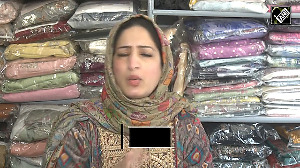Defending Ajmal Kasab, the prime accused in the Mumbai terror attacks case, has been a difficult assignment for his lawyer Abbas Kazmi, who has complained about the lack of privacy during discussions with his client.
"The judge has permitted interviews for short durations of 10-15 minutes but it has to be conducted in the court itself, and that too within the earshot of policemen and the court staff," his counsel Abbas Kazmi said.
Asked about how Kasab came across during these discussions, he said, "We talk only about the case and its legal aspects. He has never opened up or conveyed his feelings."
About the mood swings of the lone Pakistani terrorist who was captured during the 26/11 Mumbai terror strikes, Kazmi said those were expressions of frustration and boredom.
"I gave him some story books in Urdu. He finished reading them but never sought more," he said.
Kazmi claimed there was no evidence to show that Kasab was a habitual criminal.
"He is like any other accused; presumed to be innocent unless proved guilty," Kazmi said.
Asked about his strategy for defending Kasab, he said, "I will not open up my cards now. You will know when the arguments begin."
Kazmi rued that he was not allowed to carry his mobile phone to the court. "I sit there all through the day as the trial goes on. Without a cell phone, I am unable to keep in touch with my clients and my practice has suffered".
He is also unhappy about being denied permission to carry a laptop to the court.
"I cannot carry the bulky 13,500-page chargesheet every day to the court and hence need a laptop to refer to the documents. When the witnesses step into the box, there is no material with me readily available to cross examine them," Kasab's counsel said.
He also said when the trial commenced in May, he had requested for four weeks time to study the chargesheet, but the court allowed him only a few days.
"So I virtually proceeded with the trial without properly studying the chargesheet," the defence lawyer said. Kazmi said he had not yet decided on examining defence witnesses but if need be, he may examine them.
On the prosecution's move to file affidavits of 300 more witnesses instead of examining them personally, Kazmi said, "If that happens, we may cross-examine some of them if there is a need."







 © 2025
© 2025